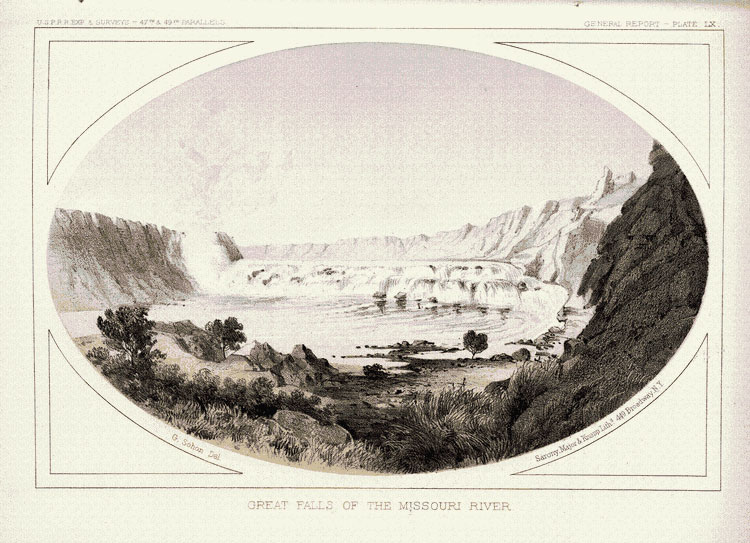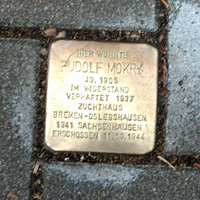It was June 1805, and the members of the Lewis and Clark expedition reached the base of the Great Falls of the Missouri. “Lewis was thrilled to see the enormous waterfall, the Great Falls of the Missouri. It was 900 feet wide and 80 feet high with a ‘beautiful rainbow’ just above the spray. Lewis called it ‘the grandest sight’ he ‘ever beheld.'” The grandest sight was also a grand obstacle. The Corps of Discovery had spoken with Native Americans familiar with territory to learn of what lay ahead. Their expectation was a difficult one-mile portage of their equipment around the falls. What they found was a much more significant challenge:
The Corps would have to hike 18 miles to get around the five waterfalls. They left their heaviest boat and equipment hidden near the base of the falls. The other canoes and supplies were carried, dragged, and pushed. The Corps created makeshift wagons. When the wind was strong, they attached the boat sails to help move the equipment. The ground was rocky, uneven, and hard. Prickly pear cactuses were everywhere. The Corps wore through their moccasins every two days. The intense heat of the summer sun was interrupted by violent storms, with thunder, rain, and hailstones the size of eggs. Swarms of gnats and mosquitoes pestered them. Rattlesnakes and grizzly bears were a constant threat. (Library of Congress)
The eighteen-mile portage around the Great Falls of the Missouri would take thirty-one days. Before they could continue their journey up the Missouri River, the Corps would have to build new boats to replace the ones left behind.
There are many stories in the journals of Lewis and Clark that describe perseverance through unexpected adversity. Five months ago, we began a journey together as a church and community. We thought we would make a simple portage around a small snag. What we have experienced is the grandest sight and grandest obstacle of many of our lifetimes.
What has made it the grandest sight? Every preacher, it seems, has said, “The church is not the building. It is the people.” The last five months have challenged us whether we really believed it. What I have seen is a beautiful sight. Like a rainbow in the mist over raging falls, its beauty holds me, and I do not wish to walk away from it, even if I must. The vision I have seen is a church come alive. I have witnessed people carrying for each other and watching out for their neighbors. People smile behind masks. They wave as we pass, even if we have never met. Groups have gathered together to pray and study the scriptures in their homes. We have become less dependent on the programs and structure of the church to prop-up our faith and much more dependent on the work of the Holy Spirit. It’s awe-inspiringly beautiful, and I fear its loss.
I am also aware these five months have been unmercifully brutal on some. People are unemployed and facing eviction. Families are starving. Friends have died. Many feel left behind and left out. Loneliness, darkness, depression have been consuming. I do not wish for these days to continue and long for the morning to come that will bring joy.
What we are experiencing is an arduous trek whose end is not yet in sight. The end will come, and when it does, we will once again put ourselves back in the waters of a much smoother journey. To continue the journey, though, new tools, equipment, and methods will have to be fashioned.
For many of our churches, we have rolled most of our ministry online, and in doing so, we have taken our in-person programming and put it online with few changes made for the medium. It has been like putting sails meant for a boat on a wagon. At some point, we will have to find a better way. Before the pandemic, online worship was never an effective replacement for in-person. Primarily online worship served two purposes. First, it allowed those who were not able to attend in-person, because of work, vacation, or sickness, to continue to stay connected to their familiar community. Second, online worship served as a way for persons to visit a church without having to visit the church physically. It was a very low commitment way to try out a community.
I firmly believe that online can be an effective medium for a church community. I also believe it will require changing our methods and expectations. Like John Wesley preaching on a coal pile or George Whitefield preaching in the fields, it will be uncomfortable, awkward, and not without its critics. I believe this is a time that calls for us to try anyway. Already there are many critics who say it can’t be done. Already there are many questioning the theological soundness of those who are trying. It’s time we turn off those voices and just try. We may fail, but at least we tried. To do nothing is to guarantee our failure.
What will we have to change and do differently? I do not know. Right now, we are still struggling to get around the falls. Even as Lewis and Clark put their newly fashioned boats in the waters of the Missouri above the falls, an even more significant challenge lay before them: The Rocky Mountains. To cross this obstacle would require leaving their boats behind entirely as they depended on Sacajawea, a female Shoshone, to lead them through uncharted territory. Perhaps, we will have to leave our canoes behind too and submit to be led by those whose voices we refused to listen to or value before.
Our journey is not at an end, so it is difficult to say what it will be like on the other side. But we do have glimpses, and I would love to hear your thoughts.
Blessings,
Stephen
Quote and Picture Source:
http://www.americaslibrary.gov/aa/lewisandclark/aa_lewisandclark_portage_1.html










